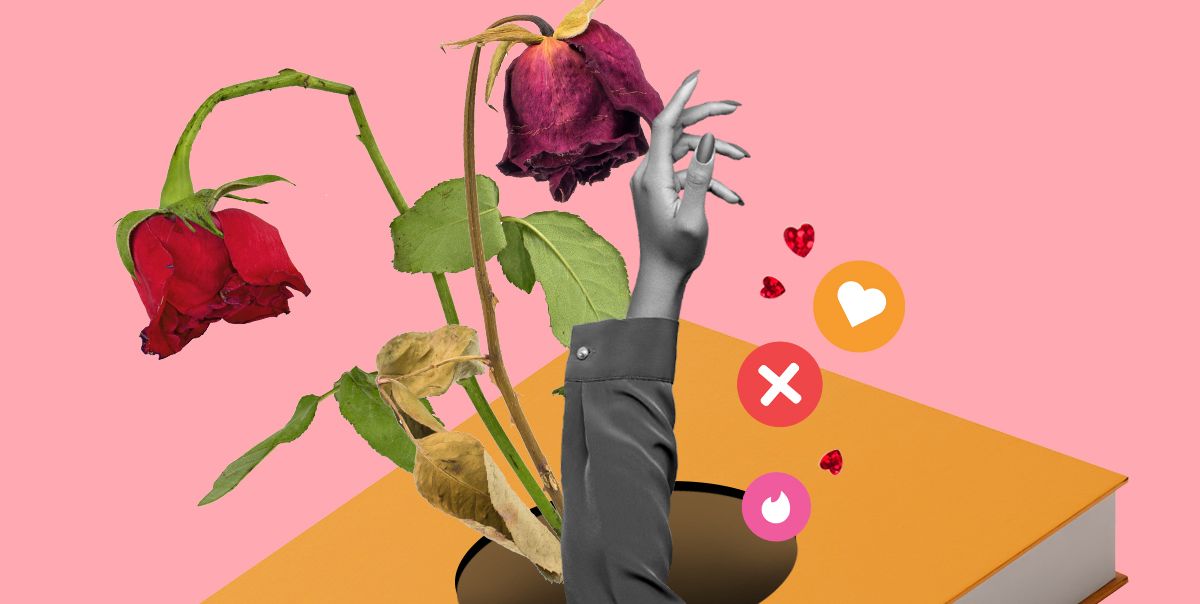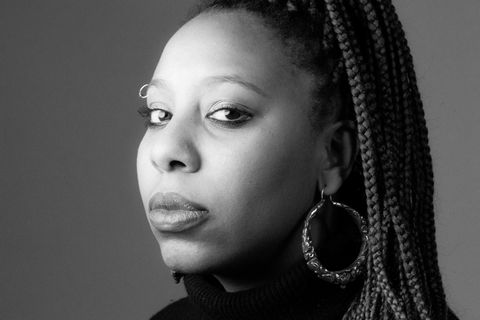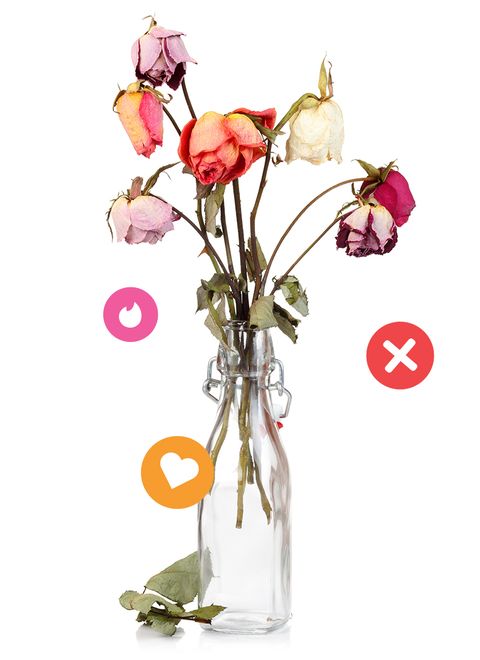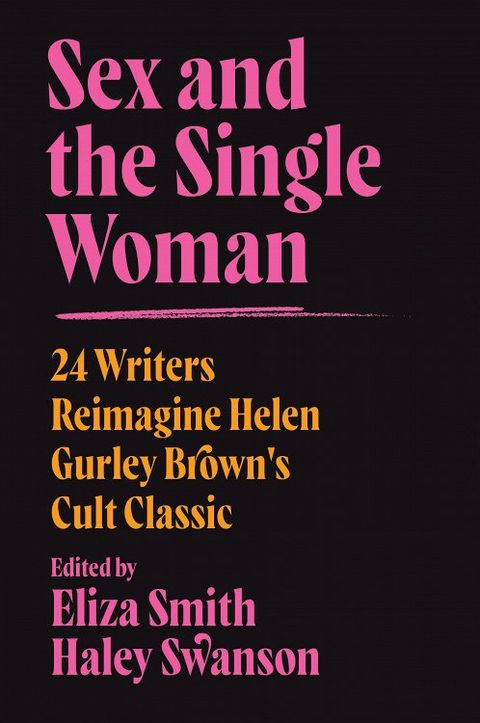I’ve never read a self-help book before. I don’t like when people tell me what to do, and I really hate when they’re telling everyone else the same thing. Yet here I am, earnestly and soberly poring over a quiz in a self-help book about relationships, which I actually spent money on because I’m 33 years old, and I’ve been single my entire life.
Not single “for a long time,” but single forever, the whole time. Single may not even be the right word, because absence implies a memory of what once took its place. I’m single the way a baby is single.
By most sociocultural standards established since the beginning of time, my adult life could be viewed as inadequate and incomplete, if not tragic.
One thing about being unhappily single in your thirties—besides the very real biological and social pressure to reproduce—is everybody thinks there must be a reason why. A reason that you must be somewhat content with or aware of, if you’re taking no steps to improve your situation. As long as a person is unhappily single, there must be something wrong. You must need help.
Everyone has an opinion, whether I ask for it or not. Even strangers assume the authority to spit out armchair wisdom about what I need to do, acknowledge, let go of; how to get out of my comfort zone or “be open” or whatever. Because, of course, it’s the task of the single person to receive and carry out any instruction from self-help books, magazines, friends, coworkers, mothers, people on buses, seminars, cab drivers, etc.
When it’s not friends or Uber drivers with hollow clichés and prepackaged, one-size-fits-all advice, it’s middle-aged businessmen at hotel bars or chatty randoms on airplanes with the gall to throw the question at me, shaking their heads like I’m a math problem. Sometimes it’s people I’d hoped might be interested themselves, men who would go on to kiss or sleep with me, and even those who’d already done so.
“Why are you single?” they press, in disbelief or suspicion, rattling off my many fantastic qualities.
Rarely am I speechless. But I never have a witty quip in response to this question, and the words you tell me feel like glass shards leaving my throat. “Slavery, white women,” I replied once. Another time, on what I’d foolishly thought to be a date, I pressed my palms to the table and announced, “I believe I am the least desirable woman in America.”
“I’m just not in a good place for a relationship right now,” they say, before starting one with somebody else a week later. One such man lamented to me that he was an anxious avoidant personality. Usually, they’re just hung up on their exes.
When white guys say it, I hate that I have to wonder if they’re also trying to avoid the reality of actually having a Black girlfriend—bringing her home to the family in Maryland or Milwaukee; potentially adjusting the makeup of his social life; becoming compelled, as if possessed, to blurt out, “My girlfriend’s Black,” in defense, or as confession, explanation, excuse.
“You deserve someone better,” they say. But “I’m not good enough for you” is just another way of making the rejection feel like my fault. No one answers the question.
I mentioned the anxious avoidant terminology to my psychiatrist, the one who’s always telling me to go on dates, and who’s been trying to steer me away from “young men who are artist types.” She recommended this book on “attachment styles” and explained how the authors suggest that people are either anxious, secure, or avoidant in relationships. She said I’m attracting the wrong attachment style. So I bought the self-help book and endeavored to read it.
I barely skim the intro, guiltlessly gliding over the authors’ case studies about their friends—Pam’s low self-esteem, Sam’s obsession with his ex, Eli’s boredom with his marriage—but when I read the bulleted list of each attachment style’s tendencies, my throat drops to my stomach: Every column’s unhealthy patterns and self-sabotaging behaviors ring uncomfortably true. In lime-green pen I write lol next to a short paragraph on the “rare combination of attachment anxiety and avoidance,” a category that “only a small percentage of the population falls into,” because it describes 99 percent of my dating pool. You can find anxious avoidant people, me included, among most “artist types,” especially the young men.
I know what you’re thinking.
“Have you tried the apps?”
Everyone offers examples of happily committed app users, sometimes including themselves. Even people who don’t know what the apps are suggest I try the apps. People love the apps.
I created my first online dating profile fresh out of college and still hopeful, curled up on a curb-salvaged loveseat in the funeral home for mice that was my Avenue C apartment. My roommate, who worked in fashion, told me it was an “instant confidence booster.” After 10 years and countless starts and stops—including profiles ghostwritten by expert friends and even a full-year premium membership at no small cost, albeit subscribed to by an accidental slip of the thumb—I’ve formally decided I hate the apps.
My thing about the apps: They make me feel terrible about myself. Like I’m back in middle school. Like I’m watching The Bachelor or whatever reality show it is, with all the white women standing in a line being desired. Like I’ve felt too many times before.
Once something becomes a cultural phenomenon—a mode of communication, an economic system—it begins to feel necessary, and not engaging with it means risking detachment or ostracization. For this and other reasons, including smoking bans on planes, I hate living when I do, and hope eternal for a more suitable placement in my next lifetime.
In order to even be considered eligible for courtship, you have to first be good at taking pictures of yourself on a phone, which projects your face back at you, taunting. You would be judged only by this snapshot of yourself, conveying just a hint of a personality—careful! Not too much!—and a level of sex appeal on par with that of an “Instagram model,” whatever that is.
And it’s not just that there’s no smoking on planes, it’s also those little pictures of cigarettes slashed through with a hard red line, glaring at me from every surface. The reminder of restriction.
I hate taking pictures of myself on my phone. I don’t care to spend time staring back at myself in reverse, practicing a face. Instead, I’m good with words, and I’ve tried to develop my awkward version of in-person charm—what one reader called “a quirky and relatable vibe.”
Vibes and words on dating profiles are secondary at best and might go unread entirely. There’s no point in fretting over authenticity when most of the messages you receive just say hey, how’s your day going? copied and pasted with no personalization or effort required, like being seduced by a greeting card that’s blank inside. The About Me doesn’t matter because “bored, might delete” would perfectly suffice; and the standard template on both ends is little more than I’m just a regular girl, I love music, food, and staying fit! Down for an afternoon hike and a craft beer?
Nothing against the regular girl, whom I probably know and love. She’s by all cultural standards happier than I am. She gets to relax, check off the boxes of adulthood, certain of her worth and beauty. I’m not and don’t really want to be just a regular girl. But I want what she has, what she seems to so easily get.
The Why are you single? conundrum has sidled up easily to the shame I’ve felt about the ugly sides of my depression, which piggybacked nicely on the isolation of growing up a weird Black girl in a traditional white suburb. It’s not like I needed any extra encouragement to discipline and punish my every flaw, everything that makes me different, anything that someone else might not like about me.
How would I act or even feel if there were no movies, self-help studies, or think pieces teaching me how, teaching all of us the same how, telling us what to desire?
I’m a scholar of my surface-level self-esteem stuff and the African American self-esteem stuff, the consequences of an unconventional artist lifestyle, being intimidating, fearing commitment, and abandonment and intimacy and rejection—basically all the fears. I understand my culpability and self-sabotage. (Additionally, it cannot be overstated how impactful the transatlantic slave trade and its resulting political and economic values has been in determining the results of my love life.)
I’ve been Girl with Impossibly High Standards, Girl Who Puts Career First, Girl Who Self-Sabotages Out of Fear, Girl Who Needs to Love Herself First, and Girl Who Gets in Her Own Way, Girl with Unresolved Questions About Sexuality, Girl with Unhealthy Trauma-Based Defenses. I’ve lived and shed every rom-com protagonist’s problems.
There’s a cultural assumption that as soon as you’ve worked those things out, you find your person and start making a family/household/life. Until then, you’re not ready, and you’re tasked with headbutting and knocking down each internal issue, no matter how much it hurts or how unfair it is that you must assess, Valentine’s Day after Valentine’s Day, what’s wrong about your body or “energy” or psychology or vocabulary or life choices.
Surely not even half the people who’ve been in love have endured such extensive and unceasing analysis. It seems other people quit critical self-assessment as soon as they’re seriously partnered, and instead assume the authority to assess what’s wrong with me and the life choices I’ve made. Unlike me, they have a piece of paper someone signed, promising not to freak out and leave when they’re having a bad mental health day.
Before I’ve seen such commitment with my own eyes, how can I be sure?
Until you’ve been in love, until you’ve had your heart broken, there’s a large portion of popular culture that’s sung at a pitch you can’t hear. I can’t sit through an episode of Sex and the City without spiraling into a fervent scree about expectations of femininity and pointing out oppressive value systems.
Lately, even true crime pisses me off, because serial killers on death row are somehow managing to fall in love left and right. I can’t stop thinking about how many chances for plots I’ve missed, and how I’d never wear that or put up with that, and that must be the reason I’m alone.
I went through high school without a boyfriend; college without a boyfriend or girlfriend; my twenties without cohabitation or postbreakup Ben & Jerry’s; no sloppy one-night stands at a bar in Williamsburg or a club on the Lower East Side turned into anything more. As years go by, narrative after narrative evades me; the possible storylines and adventures dwindle, and little gasps of optimism deflate, and deflate, and deflate.
There is a difference between being single in your thirties and being “still single” in your thirties. Even I get turned off by restaurants on Seamless with no reviews and none of the stars colored in. Not worth the risk when there are so many other options with rave reviews and familiar names.
I know it’s not like I missed my chance or anything, but part of me mourns the love stories that could’ve been.
What I mean is: I’ve grown up from a lonely girl into an alone woman.
The attachment-style quiz is the main appeal of the self-help book for me, a former straight-A student happy to be given a tangible task, instead of “practice being more open.” In spite of steadfast doubt that I’ll be in any way transformed by the book’s theories, I catch a gust of excitement at the prospect of righting the wrong of my style, the promise of becoming secure and even potentially attracting a secure person.
In chapters 3 and 4, the authors promise a two-step process for determining my attachment style and that of my partner. I skip the worksheet asking me to list examples from past relationships, and the whole chapter about the partner, triggered and ashamed that I can’t even advance to step two. I sternly tell myself to discard the feeling that I’m automatically disqualified, beyond help. My most comparable experience to real relationships is situationships. So, not nothing. But kind of nothing. I satisfy my sexual needs by waiting around for “hanging out” to turn into drunk, which then turns into “hooking up”—or, simply put, I have sex with my friends. Ours is a generation that thrives on vagueness, whatever gives us the most leeway in the end. We don’t go on dates, we “hang out”; we despise labels.
None of the authors’ case studies depict someone in this label-less predicament, devoid of exes altogether. I scan my heart’s memories, searching for any dalliance that might, with the right embellishment, suffice as data, at least for these purposes.
I’ve briefly entertained infrequent and ill-fated possibilities for romance, but one could convincingly classify all these instances as flings or one-night stands or some variation/combination thereof—flirtations I knew wouldn’t work out but irrationally hoped might finally be my romantic storyline. Growing up I was the guys’ “closest girl friend,” first by default, as the less desirable option than the white girl, then when I realized there was little hope in escaping the platonic identity. At least I could delude myself into imagining a Will-they-or-won’t-they? plot brewing three layers below reality. There are a lot of movies with romantic narratives like this, so probability-wise, the friend zone isn’t the absolute worst place to hang out. But situationships are just wax fruits in a bowl: They look like the real thing until you try to taste.
I take the attachment-style quiz like it’s the fucking SAT, reading and rereading every statement, hounding myself to be truthful (how much would I care if I saw my date checking out someone else, really?), counting and recounting and crossing things out. I even put it down and return to it days later with fresh eyes.
This is the kind of thing I choose to take seriously or assume that I must. With any luck, correctly calculating my score will illuminate the long-elusive question posed by men in my bed and kind old ladies alike: Why are you single?
I’ve been genuinely trying to “be open” and “put myself out there.” I go to bars alone like it’s my job, and I even look around, resisting the glow of my phone and merely pretending to read. But what I’ve found is nobody is interested in looking at anyone, not right away, not by any means of effort. At least not at me. What I’ve found are people scrolling Tinder. In the bar. Right next to a single person. Never making contact, not even to say, hey, how’s your day going?
In real life, no handsome stranger reaches for the same bell pepper in the produce section, no glances are exchanged in bookstore aisles, no martini appears “from the gentleman at the end of the bar.” Everyone is terrible, and putting yourself out there really means putting yourself into the phone, where someone might actually be looking.
It’s a tie: five points in the anxious category; five points in secure. In the avoidant category, one point.
I believe my singleness should be considered a community issue; that anyone who knows and regularly interacts with me should be as equally invested in my struggle-search for love. But since the apps became ubiquitous, nobody has set me up.
It’s much easier (read: effortless) to blurt the name of an app you saw on a commercial than to ponder who might be eligible, let alone reach out to facilitate a setup. Personally, I wonder why they’d rather me meet a stranger on the internet with a one-line About Me, who could be a murderer or rapist or regular old white supremacist, than to suggest a mediocre date with a mediocre guy from their office cafeteria. At least I’d know he’s a proper human, and if I disappeared, they’d have a lead.
In our early twenties, singleness was a community issue. We took our responsibility as wingpersons moderately seriously, prioritizing locations where we might meet potential mates, scanning rooms and doing a lap around the dance floor for prospects. This is no longer the goal of the collective. It’s just my problem. I am nobody’s responsibility.
Something else about the apps: They’re like a whole fucking part-time job. Apparently, you have to put in several hours a week, otherwise you won’t even show up on anybody’s radar.
As if. I could write four whole books with all that time, and have.
Another game-changing storyline I missed is meeting someone before I became a “public figure” (i.e., on Wikipedia).
As I chose poetry readings over clubs, blazers over party tops, I was aware on a surface level that I was guilty of “putting my career first” and risking prospects. I sort of expected to be in the musical-chairs conundrum I’m in, feeling like I missed an important window. But I didn’t realize that by the time I was ready for a relationship, I wouldn’t be just a “person” anymore, that I’d have another incarnation.
I’m “out there,” everywhere, a lot. According to several unhelpful opinions, that’s part of the problem. Flaunting a gregarious stage presence has done little to quash my problem of being “intimidating,” feedback I first received at age 12.
If you’re an artist in front of an audience, your best bet is to take whatever you already are and make it extra, be yourself to the extreme. In dating, the opposite is advised. Apparently, you’re not supposed to put it all out there at once. I find this vehemently counterintuitive, if not insulting.
It would be impossible for me to mind the traditional rules about stuff you’re not supposed to say on a first date, since I say it all the time to audiences across the country. I’m just not in the habit of being demure or mysterious. What’s the point of a slow reveal, if my whole job is going around talking about how sad I am, blowing off any opportunity to be coy or cutesy? I think that’s why I find even the idea of dating boring. Who has the time to pretend to be one person, then hope your partner doesn’t notice you slowly morphing into another, more complicated, and less shiny version?
In the absence of real intimacy, without proper experience or acceptance of it, I’ve practically professionalized vulnerability—to my assistance, and to my detriment.
To one of the standard OkCupid profile prompts, The most private thing I’m willing to admit, I answer, is probably already accessible on the internet. If you Google me, one of the first things that comes up is a personal essay detailing how many antidepressants I take.
By now, my destructive patterns are obvious. It’s easier for me to hear no and dismiss it than to wait for yes. Men tell me they’re unavailable or unfit, yet obviously I pursue them, virtually begging them to make out as soon as “un-” is uttered, as soon as I know it won’t work. Traditional, practical dating rituals are so much less interesting than the outcomes of wild, destined, and illuminating love, or the opportunity for more self-loathing and sticky emotional conundrums.
Conventional dating practices might actually lead to something promising, and what then?
My primary skills of adulthood concern survival and salvage: cleaning up after my every innocent blunder; “figuring it out”; embodying man, woman, and child of the household. Flipping from one to another quicker than a code switch. To an extent, I’m incapable of imagining how I might fare or function in a couple. What if I’m too far behind, too embittered or untrusting?
Sometimes, consoling or debating a potential-love-interest-in-my-imagination about his Actual Relationship, or anxieties or philosophy books or trauma, I’m aware that this guy’s being someone he isn’t or can’t be with his current partner (who’s usually of the Carefree White Girl variety). I wonder if that makes me immediately less desirable, not sexy—knowing them on that level. Being real.
I’m not the one they choose to make official. I’ve never been wanted enough to be. I’ve also, consciously or not, chosen not to be.
Both the problem and appeal of nonrelationship relationships is that they remove any responsibility from the deal. A foolhardy attempt to resist narrative and do away with the consequences of linearity.
Part of me is romanced by these terms. There is safety in clinging to the options of only wild and sticky, in being the one to make things difficult for myself before anybody else can.
You give: blow jobs, compliments, hours of unpaid emotional labor. You get what you get.
I have a good life. Though it’s caused inordinate grief in my daily existence, my continued and seasoned identity as Single Woman in this socioeconomic situation—as my life becomes more complicated and ambitious—has required me to get creative about my definitions of romance, of fulfillment, of growth. It’s required me to reinterpret community and capacity. To be strong in surprising ways.
I am loved and cared for by a close family and warm, inspiring friends. I have my platonic “husbands”—a group of 14 diverse in race, gender, orientation, and actual marital status—who’ve committed to me at least in title, and to whom I’m willing to commit and call my people. In the absence of the real thing, and because I’ve found it is necessary.
I see how it could be easy to overlook just how handy another person is. Just how many large or small gestures that make all the difference in avoiding misfortune: missed flights, that last drink, losing your phone (a bunch of times), keeping plants watered, getting somewhere on time. Not to mention affection and, frankly, regular sex. I’m certain that as a partnered woman I’d receive far more respect from strangers and especially Black elders. I’d be safer.
I was taught that Miss and Ms. were placeholders until one grew up into Mrs. Traditional American family value systems are always in the backs of our minds. Even when we insist they’ve been transcended, even if we pledge a life of defiance against them, they still define how things are “supposed to be.”
The bylaws of American capitalism never meant for me, a descendent of slaves, to be a rights-holding citizen, or for me as a woman to be financially independent(ish). I’ve burst through several systemic barriers that should have left me dead or destitute by now. And in the same way, the social structure that adjusted itself to American capitalism is meant to favor the heteronormative patriarchal unit.
On a practical level, I’m less equipped than my cohabitating and committed peers to achieve the markers of successful and respectable adulthood, to meet all expectations without significant loss or charitable assistance. These are things I have a feeling my paired-off friends don’t take into consideration when evaluating the appropriateness of my incessant despair. While you don’t need a partner to be happy, coupledom is assumed to be an integral part of adult life and essential for anyone with too much ambition and not enough serotonin.
If, for example, I’m traveling as a Black woman with more than two suitcases, as I often am. If I forget to drink a glass of water all day. If two people are required for assembly. When sometimes, on tour in another city, I realize no other person in the world has any idea where I am or what I am doing, and nobody needs to. If I am so depressed I can’t pull myself from bed to take the dog out. If I am depressed.
If I am depressed, and I think: Who would want this mess to bear? Why would anyone take this on, and wouldn’t it be too much to ask of a co-parent, and would it even be responsible to reproduce or build a family, considering the hazard?
Sometimes, I’ll just refuse to care for myself, in protest. Just to display how incapable I am, how unreasonable it is to expect one person to be so casually adept at so many things at the exact same time.
A text notification says the number of gun owners nationally has doubled, and those who already had guns are buying more, many citing civil unrest and racial tensions as their inspiration.
The next alert tells me my OkCupid account has been deleted due to inactivity. I didn’t even know that could happen.
The problem is time. It shouldn’t matter, but it does. Time means regret. Regret means self-punishment. It’s not just the general embarrassment of having the romantic subplot of my movie being introduced so late into act 2, it’s also the close-fitting sense that time runs out faster for women like me.
What if I die before getting a look at myself in the bright mirror that is partnership, before tasting what everybody’s talking about? Before finding somewhere to pour this devotion I’ve stored up, all this romance I’ve accumulated and dreamed? I’m a poet who’s never experienced true romantic love; I believe this is an American tragedy.
When I go on strike against myself, nobody is there to see the display. No one rescues me, because I’m not a damsel. I can only care for myself by myself.
These days, stillness is the new hustle, the new collective goal. I’m just as tired as we all are, just as ready to exhale. I fantasize about moving to the Valley, a suburb outside the city—settling into the aloneness I know so well, before it’s too late to get comfortable at all. Nobody wants a single artist living at the end of their suburban cul-de-sac, front porch blasting Fela in the morning and wafting weed smoke in the afternoon. Planned communities have no tables for one. Protection is built that way.
I am a 33-year-old single Black female, self-employed, mentally ill, foulmouthed and politically radical. I can’t move just anywhere. My safety is never in my control. My comfort isn’t guaranteed.
While it doesn’t invalidate my successes, the inability to achieve this one life goal—to “find love”—casts a little sorrow on the others. Even major achievements have a sour aftertaste. The more exciting things get, the more disappointed I am. Without a witness, a stakeholder, a rock—why bother?
If one is always in wait of one’s Great Love, if every story depends upon this arc, how am I to be proud of the life I’ve created, who I’ve let myself become? When am I allowed to get comfortable, feel grown? If I choose to keep hoping for a romantic plot twist, does that render my story incomplete, still a pulsing cursor? And if I settle down, officially give up fretting over profile pages and wanting more from my flings and situations, would it be resignation?
Sometimes it hurts to think about, but then I just write another book, masturbate, cry, complain on Twitter, write another book.
I’m bored of being lonely. I’ve whined about it, gotten good at it, made it useful. I’ve learned and lived with my heart, the emotional sting of yearning. But there’s still lack, and difficulty. There’s still danger, everywhere.
The self-help book collects dust on a nightstand under an inspirational-type book from my other therapist, the one who’s always telling me to “maybe just start thinking about possibly going on dates.” We don’t talk about loneliness anymore. Mostly, we talk about fear.
My life is a good one.
I don’t want to keep it to myself.
From “Self Help” Copyright © 2022 by Morgan Parker. Excerpted from the book SEX AND THE SINGLE WOMAN: 24 Writers Reimagine Helen Gurley Brown’s Cult Classic, edited by Eliza Smith and Haley Swanson. Compilation and introduction copyright © 2022 by Eliza Smith and Haley Swanson. Published by Harper Perennial, an imprint of HarperCollins. Reprinted by permission.
This content is created and maintained by a third party, and imported onto this page to help users provide their email addresses. You may be able to find more information about this and similar content at piano.io




